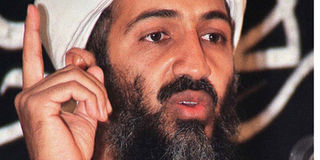High alert a year after Osama gunned down

Photo/FILE/AFP
Osama Bin Laden: The al-Qaeda leader who was killed by US troops.
Security agencies around the world were on Tuesday on high alert on the first anniversary of the killing of the mastermind of Al Qaeda terror group, Osama bin Laden.
In Kenya, security services are at an unprecedented state of alert amid reports that Al Qaeda linked Somali terrorist group, Al-Shabaab, is planning an attack at strategic installations.
A senior official of the Anti-Terrorist Police Unit said they had received intelligence reports that Al-Shabaab terrorists are planning an attack, but adequate security measures are in place to deal with the threat.
Last week, the US Embassy in Nairobi warned that terrorists were planning strikes against hotels and government buildings.
The embassy said it had credible information that the attacks were in the final planning stage, but said the timing was not known.
Officials in Britain and the United States have repeatedly warned in recent months of expected attacks in Kenya, which suffered from a spate of abductions of aid workers and tourists late last year.
Grenade attack
On Sunday, a one person was killed and 16 others injured after a grenade attack targeting God’s House of Miracles International Church in Nairobi’s Ngara area. (READ: One dead, ten injured in Nairobi grenade attack)
Police are still investigating the incident. No group has claimed responsibility for the attack, although police are looking for a young man who was in the congregation and is said to have thrown the grenade.
Kenya has been hit by a series of grenade attacks, including two in the coastal town of Mombasa that killed one and injured 33.
Al-Shabaab has in the past claimed responsibility for some of the terrorist attacks in Kenya, saying they were in retaliation to Kenya’s decision to send troops to the war torn Horn of Africa country.
On Tuesday, it emerged that churches, hotels and shopping malls are among social places being provided with blanket security in an effort to prevent a terrorist attack.
Security officials said a detailed operational plan has been launched to guide officers on terrorism prevention and detection, and how to act in case of an emergency.
New measures have resulted in the security of selected ordinary public places being upgraded, albeit temporarily, to the status known in security parlance as “vital installations”.
Normally, vital installations would, among others, include airports, military barracks, police stations and foreign missions in Kenya.
In the US, federal authorities have increased their vigilance at selected airports abroad by sending more security officers to monitor commercial flights into the United States, according to two government officials.
Among the concerns is that terrorists will ingest explosives and try to detonate them on a commercial flight, the officials said.
“For a long time there has been a concern of attacks on aircraft surrounding the anniversary of bin Laden’s death,” one official said.
“There have also been concerns for some time that terrorists will put explosives in their bodies and explode them. These are being revisited at the anniversary, but there is no specific credible information about an attack.”
The official added: “There is just an abundance of caution around the anniversary and recognition that there is a potential for a retaliation attack of some kind. But there is no specific information about an imminent attack.”
According to New York Times, the officials spoke on the condition of anonymity because they did not want to jeopardise their access to secret government information.
The Department of Homeland Security released a statement on Monday evening saying that although the threats from Al Qaeda and its affiliates continued to evolve, officials had “no indication of any specific, credible threats or plots against the US tied to the one-year anniversary of bin Laden’s death.”
The department “will continue to monitor intelligence reporting and respond appropriately to protect the American people from an ever-evolving threat picture,” said Peter Boogaard, a spokesman for the department. The heightened security was first reported by ABC News.
Following the killing of bin Laden by US special forces in Abbotabad, Pakistan last year, Ayman al-Zawahiri, who was the Al Qaeda leader’s deputy was appointed to take over the leadership of the world’s number one terrorist group.
Born into a wealthy family in Cairo, al-Zawahiri is a physician and founding member of the Egyptian Islamic Jihad (EIJ), a militant organisation that opposed the then secular Egyptian government of Hosni Mubarak.
Like bin Laden, al-Zawahiri also went to Afghanistan to fight the Soviets, although he was there primarily to offer his medical expertise.
By the 1990s, he again focused his attention on undermining and attacking the Egyptian government and, eventually, the US.
In 1998, when the Egyptian Islamic Jihad effectively merged with Al Qaeda, he sent a fax to the al-Hayat newspaper warning Americans.
Since taking over the Al Qaeda leadership, al-Zawahiri has been quiet. Security agencies fear he could be masterminding a major terrorist attack.
The war-torn Somalia has been a safe haven for Al Qaeda linked terrorists who have turned the country into one of their leading training bases and a launching pad for attacks in East Africa region.
The emergence of Al Qaeda in Somalia started in the 1990s when some of the Somali fighters who had joined the anti-Soviet struggle in Afghanistan started returning home.
The returning Somali mujahidin helped to establish another militant Islamist movement called Al Ittihad Al Islamiya, Arabic for “the Islamic Union” which started training Al Qaeda operatives.




